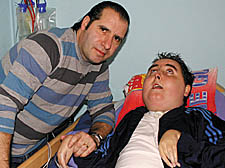|
|
 |
| |

Peter Cordara with his father Guido |
‘My disabled son is left a prisoner in his home’
Dad says health authority won’t provide the necessary wheelchair
A BRAIN-damaged teenager has been made a prisoner in his own home for more than two years because Camden’s health authority won’t give him the correct wheelchair, his family claim.
Peter Cordara, 19, who suffered a brain injury, from a lack of oxygen following an asthma attack at the age of 14, can only leave his Gospel Oak home on a stretcher by ambulance.
Other than for hospital and physiotherapy appointments, Peter hasn’t been out of his house for three years. His family can’t take him out in his current wheelchair because, they say, it was so badly measured that he keeps sliding out of it, unless he is reclined to an uncomfortable angle.
But Camden Primary Care Trust (PCT) says a specialist engineer has assessed Peter’s chair and it will be replaced – but not by a model his family is happy with.
Peter, a devoted Arsenal fan and former William Ellis pupil, of Kingsford Street, requires 24-hour care, given to him by his family and visiting nurses.
He can only communicate by blinking, relies on his family and nurses for all health and hygiene needs and the only part of his body he can move is his head.
His father Guido said: “If you kept a dog locked up for a certain amount of time, you can be prosecuted for it. They are doing that to my son.”
He said the family had written to the minister for disabled people Ann Maguire but had no joy.
He added: “All we want to do is carry on with our lives, we’re stuck in here 24 hours a day. We can’t even take him to the cinema or to the park. He’s got no quality of life, we can’t take him to the Heath, he’s bored, he has no stimulae. If we want to take him out we have to beg the PCT to send an ambulance. The PCT rules our lives.”
Mr Cordara says the PCT has ignored requests from Peter’s specialist consultant for him to be sent to Stanmore Hospital, which is willing to give him an appropriate chair.
Labour councillor Roger Robinson said: “I’m getting a bit tired of disabled people being treated like second class citizens. Peter should have proper access to society, community and that includes a wheelchair to fit his needs and aspirations.
“It’s been a long time since Peter became disabled and we can’t seem to get very far. I can’t understand why he can’t have the chair he needs. It’s an uphill battle but we’re going to keep trying.”
A PCT spokeswoman said: “Mr Cordara is known to Camden PCT’s Physical Disability and Brain Injury Services and he and his family are supported in the community via the provision of a complex package of community care.
“Mr Cordara’s needs have been thoroughly assessed by a multi-disciplinary panel and appropriate levels of care have been put in place in line with the PCT’s policies.
“Mr Cordara was provided with a chair in March 2002 and continues to have use of this. As users continue to develop physically there is a need to either modify or replace the chair.
“Camden PCT purchased the services of a Customised Seating Engineer who is a specialist in wheelchair design (and who also acts as the advisor to the Royal National Orthopaedic Hospital) to advise on the best possible seating.
“Following this assessment a new chair was recommended. Mr and Mrs Cordara believe that the chair should be of a higher specification however this is not a view shared by the clinicians in the Wheelchair Service and the independent expert who advised on the appropriateness of the chair.”
|
 |
|
 |
|